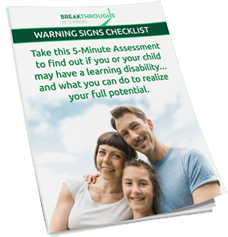
Does it affect life at home, at school or at work?
Take 5 minutes to complete the Warning Signs Checklist and discover whether you or your child could have learning difficulties that are impacting your life, and what to do about it.
Take The Free Warning Signs Checklist!
There are many myths regarding causes of learning disabilities. These myths lead to confusion and misinformation about what learning disabilities are and where they come from. In contrast, several plausible theories describe possible causes. These causes are often not definitive, but instead offer possible explanations. No matter the cause, children can develop the effected brain skills and begin to find success in school and in life.
Parents who suffer learning disabilities are more likely to have children who also suffer learning disabilities.
However, strangely enough, children’s learning disabilities may differ just slightly than their parents’ challenges. For example, an adult with difficulty writing may have a child with language disorders. This shows that rather than be consistently directly inherited, a child may inherit a subtle brain difference that eventually turns into a learning disability as he grows up.
Disruption to the fetus during brain development may change brain structure. Very serious disruptions, such as drug or alcohol use, can cause a significant developmental delay and substance dependence.
However, minor disruptions, many that have nothing to do with how the mother is taking care of herself, can make small changes in brain structure. For example, a mother’s immune system may overreact to the fetus’ presence and attack it as though it were an infection. Research indicates that some of these minor changes may manifest later as learning disabilities.
Complications during birth contributing to learning disorders are often related to lack of oxygen to the brain. Children who experienced being strangled by the umbilical cord or other instances of oxygen disruption often develop learning disabilities or developmental delays in the future.
While diet and allergies cannot directly cause learning disabilities, illnesses that result from them can disrupt early learning.
For example, milk allergies can cause ear infections. The inner ear fills with fluid which may not completely drain for up to six months. During that time hearing is affected. If the child is in a critical language development stage during that time, the distorted hearing can lead to auditory learning difficulties and even speech problems.
Cadimium and lead, two elements very prevalent in our environment, are linked to slowing brainwaves. Lead still remains in some water pipes and cadimium infiltrates food supply through the soil. Exposure to these elements by children with developing brains can have effects for a lifetime.
Further research on brain development and environmental toxins is still forthcoming but lab results show that the effects on the brain are still prevalent even after removing the toxins.
Adopted children have a higher incidence of learning disabilities. Pre-adoption history including poor prenatal care, birth complications, malnutrition and time in foster care may all be factors. Post-adoption factors may include learning a second language (if a foreign adoption), anxiety regarding being “given away”, and attachment problems due to lack of early nurturing will also figure even in a loving adoptive home.
Innocent family conditions can affect learning. If parents have undiagnosed learning disorders, they may speak with children less, or speak in distorted language. Children may then display similar traits.
Traumatic events early in childhood, including the death of a parent or other important adult, house fires, or other instances of severe stress, can restructure the brain and later contribute to learning difficulties.
Like emotional events, physical brain injuries also restructure the brain’s neuro-pathways. To make up for the injury, new pathways can form but may not be as efficient as the original structure. These injuries often later present as learning disabilities or limited cognitive functioning.
The good news is that no matter what caused a learning disability, with our assessments and individualised therapy programs, your child develop the specific skills that are affecting their ability to succeed. Your child’s performance can improve and they can experience success at home and in school. A great place to start is to use our Warning Sigs Checklist to instantly discover whether you could have a learning disability that is impacting your life, and what to do about it.
Subscribe to our newsletter and receive regular articles and resources to help you or your child perform better at school, home or work.
suscribe now
Post Your Comment Below